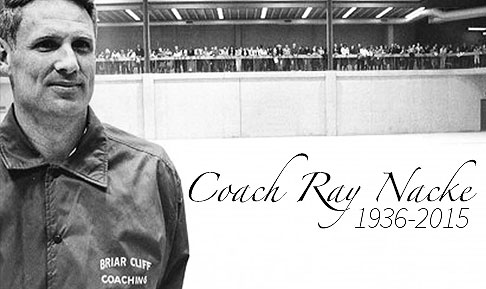Briar Cliff University’s legendary former basketball coach Ray Nacke, who guided the Charger men’s basketball team to 22 consecutive winning seasons and forged BC’s internationally renowned “Panama Pipeline,” died on Sept. 15. He was 79.
Coach Nacke passed away peacefully at his home. Funeral services are tentatively scheduled for 10 a.m. on Monday, Sept. 21, at St. Boniface Catholic Church in Sioux City. There will be a public memorial at Briar Cliff, to be announced at a later date.
“This is a sad for Briar Cliff, and the entire Siouxland community,” said Briar Cliff President Bev Wharton. “Coach Nacke’s legacy transcends basketball. More than a basketball coach; he epitomized everything we stand for at BCU. He was a devoted husband, father and coach; who cared deeply for his family, his players and this university. He will be greatly missed.”
During his 26 seasons as Briar Cliff’s head coach (between 1971-1997), Nacke’s teams compiled a 507-254 record, making him one of the winningest coaches in NAIAhistory. He guided the Chargers to nine NAIA District 15 championships, twoMidwest Independent championships and 11 trips to the NAIA Division I national tournament. His Chargers finished with a No. 1 ranking in the final NAIA poll of 1981, the same year his “Panama Pipeline” — a connection with through which Nacke recruited some of the tiny Central American country’s topbasketball talent — was thrust into the national spotlight as the focus of a Sports Illustrated article.
Nacke was inducted into the NAIA Hall of Fame in 2008. He is also a member of the Briar Cliff Athletic Hall of Fame, the Greater Siouxland Hall of Fame and the Westmar College Hall of Fame. On Feb. 4, 2012, Briar Cliff named its home basketball court “Ray Nacke Court” in the beloved coach’s honor.
“Everyone knows he was passionate about BCU and basketball,” said BCU Athletic Director Steve Gast. “But he was even more passionate about all the people he came in contact with. He sincerely cared about helping everyone find success, no matter their position in life. He was incredibly humble and always deflected success to others. He was always the first to lend a hand, the first to offer encouragement, and the first to make you feel that what you did mattered. We have lost a contributor to what BCU has become; but I know we will take hislegacy of caring for others and ensure it is always a part of who we are.”
Nacke’s rosters included some of the most accomplished players in the history of small college basketball — Rolando Frazier, who led the nation in scoring (36.4 points per game) in 1981; Mario Galvez, Briar Cliff and the state of Iowa’s all-time leading collegiate scorer; and Leon Trimmingham, who went on to become one of the most decorated players in the history of the Australian NationalBasketball League (NBL).
Twenty-nine Panamanians played for Nacke — Frazer and Galvez included. Four of Nacke’s “Panama Pipeliners” were drafted into the NBA — Frazer, Eddie Warren, Ernesto “Tito” Malcolm and Mario Butler — but they each opted to head back home and play for Panama’s national team instead. For much of the 1980’s, Panama’s national team featured an all-Briar Cliff starting lineup.
Never afraid to express his opinion to officials, Coach Nacke’s sideline antics became the stuff of legend. Opposing student sections frequently chanted, “Sit Down Ray!” Northwestern College students even inscribed that saying on a huge sign in tribute to Nacke before his last game as a head coach on Feb. 22, 1997. Longtime Siouxland radio announcer Rudy Salem summed it up this way in a poem: “When Ray walks in the gym, he’s like a priest carrying his missal. But all that changes, once the ref blows his whistle.”
Though he was fierce on the sideline, Nacke was a beloved father figure for his players off of it. They were dinner regulars at the Nacke home, a white, split-level house located at the bottom of the Briar Cliff hill. Ray and wife his wife Jeaneen, who Ray lovingly referred to as his “top assistant,” cooked, washed clothes, mended jerseys, bought new sneakers and even put the palyers up attheir own house if the Panama recruits arrived before the campus residence halls opened. Jeaneen was also a regular at practices. Coach Nacke did have one rule — he never let his Panama recruits room together. “If you put them with guys that can’t speak Spanish,” he once said, “then they have to speak English.”
“He was an old-school type, a fiery coach on the court; but he was also an old-school type gentleman off of it,” said former Briar Cliff assistant Ron Schultz, who was Nacke’s right-hand man for 22 seasons. “His players loved him, even when he prodded them, and he got the best out of them He was a great ambassador forBriar Cliff; and we all will miss him tremendously.”
Nacke had a heart attack when he was 37, and underwent heart bypass surgery in 1985 — but he kept right on coaching. Shortly after a heart surgery, when a doctor recommended he find a new profession, the readings on Nacke’s heart monitor exploded. A nurse had to rush in and pull the doctor aside — because, as Jeaneen once said, “Ray only had the heart to coach. It would have been worse for him to give it up.”
He also had a heart for fundraising. One of Nacke’s proudest achievements was to spearhead fundraising for the construction of the Newman Flanagan Center, which is still home to Briar Cliff basketball. In the early 1980’s, tired of having to ship across town to the Sioux City Auditorium for home games; and watching his players have to nail down the loose floor boards before practice in Briar Cliff’s practice facility (nothing more than a glorified maintenance shed), Nacke decided to raise money for a new arena.
Nacke criss-crossed Sioux City, pitching his idea for a new facility to donors, as if he was pitching his program to a top recruit. He’d drive up in his old, beat-up, white pickup truck. You could see the road beneath your feet in the passenger seat; the radio didn’t work, and a side mirror dangled by a cord. But Nacke believed the truck would convince prospective donors to give. “They get one look at that old truck,” someone once said, “and they’ll have to give you money.”
His plan worked, and by 1982 construction on the Newman Flanagan Center was complete. It was built quite literally, into “The Cliff” (right into the side of it; three quarters of the building sits underground). “Standing room only” crowds filled the Flanagan on a nightly basis to see the Chargers play.
“Coach Nacke had a tremendous impact on Briar Cliff University and the basketball program and Briar Cliff University as a whole,” said current Briar Cliff men’s basketball coach Nic Nelson. “Coach is the primary reason Briar Cliff has such a proud tradition in men’s basketball. But most importantly, his devotion to his players is something they will carry with them the rest of their lives. He was a terrific husband, father, and example for all of his players, our current players and all future Chargers.”
“When someone mentions Briar Cliff basketball, the first name that comes to mind is Ray Nacke,” said former BCU head coach Todd Barry, who also coached against Nacke in the 1990’s when he guided the Northwestern College basketball program. “He was one of those icons that everyone connected to Briar Cliff. We competed each other, but we were still friends. I’m going to miss him.”
Nacke was born in 1936 in rural Remsen, Iowa. He grew up and attended Westmar College in Le Mars, Iowa, where he played basketball and was eventually inducted into the athletic Hall of Fame. He married Jeaneen Anderson — who he lovingly called his “top assistant” — on June 12, 1961, at Blessed Sacrament Church in Sioux City. Fittingly, the presiding official was Monsignor Newman Flanagan.
Following his graduation at Westmar, Nacke coached for three years at Granville St. Joseph (Mo.) High School, then became the head boys coach at Bishop Heelan in Sioux City for 12 years. Nacke’s record at Heelan was 172-62, including the school’s first two state tournament berths. Nacke was named the head coach of Briar Cliff men’s basketball on April 2, 1971, nearly five years after the school began admitting men.
Ray is survived by his wife of 54 years, Jeaneen, of Sioux City; three daughters Beth Duffy, Renee Webb, Nancy Helvig, and their husbands; and nine grandchildren.







